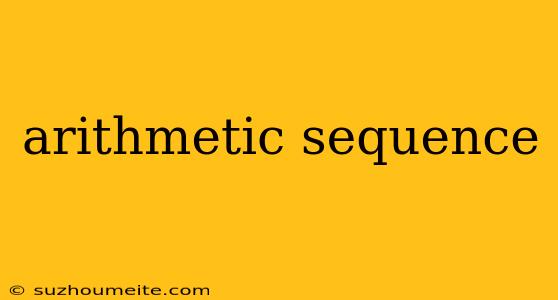Arithmetic Sequence
An arithmetic sequence is a sequence of numbers where the difference between any two consecutive terms is constant. This constant difference is called the common difference.
Key Concepts:
- General Form: An arithmetic sequence can be represented by the general form: a, a + d, a + 2d, a + 3d, ... where:
- a is the first term
- d is the common difference
- nth Term: The nth term of an arithmetic sequence is given by the formula: a<sub>n</sub> = a + (n - 1)d
- Sum of n terms: The sum of the first n terms of an arithmetic sequence is given by the formula: S<sub>n</sub> = n/2 [2a + (n - 1)d]
Examples:
Example 1:
The sequence 2, 5, 8, 11, 14... is an arithmetic sequence because the common difference is 3.
- a = 2
- d = 3
Example 2:
Find the 10th term of the arithmetic sequence 3, 7, 11, 15...
- a = 3
- d = 4
- n = 10
Using the formula a<sub>n</sub> = a + (n - 1)d, we get: a<sub>10</sub> = 3 + (10 - 1)4 = 3 + 36 = 39
Example 3:
Calculate the sum of the first 20 terms of the arithmetic sequence 1, 4, 7, 10...
- a = 1
- d = 3
- n = 20
Using the formula S<sub>n</sub> = n/2 [2a + (n - 1)d], we get: S<sub>20</sub> = 20/2 [2(1) + (20 - 1)3] = 10 [2 + 57] = 590
Applications:
Arithmetic sequences have various applications in mathematics and real-world scenarios, including:
- Linear functions: The relationship between consecutive terms in an arithmetic sequence is linear.
- Financial calculations: Calculating compound interest, loan repayments, and other financial computations can involve arithmetic sequences.
- Physics: Analyzing motion with constant acceleration and other physical phenomena can utilize arithmetic sequences.
Conclusion:
Arithmetic sequences are a fundamental concept in mathematics that provides a framework for understanding sequences with a constant difference between terms. They have numerous applications in various fields, making them an essential part of mathematical knowledge.
